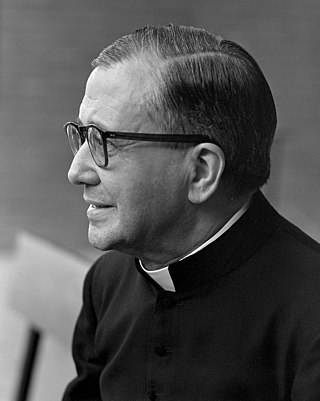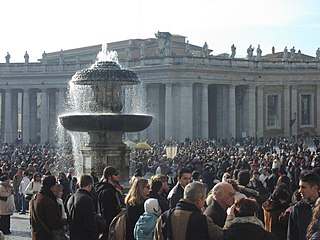
Opus Dei, formally known as the Prelature of the Holy Cross and Opus Dei, is an institution of the Catholic Church, whose members seek to implement Christian ideals in their occupations and in general society.

Saint Josemaría Escrivá de Balaguer y Albás was a Spanish Roman Catholic priest. He founded Opus Dei, an organization of laypeople and priests dedicated to the teaching that everyone is called to holiness by God and to discover sanctity in their ordinary lives. He was canonized in 2002 by Pope John Paul II, who declared Josemaría should be "counted among the great witnesses of Christianity."

A prelate is a high-ranking member of the Christian clergy who is an ordinary or who ranks in precedence with ordinaries. The word derives from the Latin praelatus, the past participle of praeferre, which means 'carry before', 'be set above or over' or 'prefer'; hence, a prelate is one set over others.
Personal prelature is a canonical structure of the Catholic Church which comprises a prelate, clergy and laity who undertake specific pastoral activities. The first personal prelature is Opus Dei. Personal prelatures, similar to dioceses and military ordinariates, are under the governance of the Vatican's Congregation for Bishops. Since 4 August 2022, personal prelatures have instead been governed under the Dicastery for the Clergy. These three types of ecclesiastical structures are composed of lay people served by their own secular clergy and prelate. Unlike dioceses, which cover territories, personal prelatures—like military ordinariates—take charge of persons as regards some objectives regardless of where they live.

Javier Echevarría Rodríguez was a Spanish bishop of the Roman Catholic Church. Until his death, he was the head of the Prelature of the Holy Cross and Opus Dei. He held doctorates in both civil and canon law.
Opus Dei: A Historical Timeline shows the historical development of Opus Dei.
Opus Dei and Catholic Church Leaders discusses the comments and observations of popes, cardinals, and other leaders of the Catholic Church as regards the Personal Prelature of the Holy Cross and Opus Dei.

Teachings of Opus Dei are the teachings of the founder of Opus Dei, St. Josemaría Escrivá de Balaguer.
Opus Dei in society refers to the social mission, general social strategy, social activities, work, relationship with politics and other aspects of Opus Dei.

The Priestly Society of the Holy Cross is an association of Catholic diocesan priests which is integrally united to the Prelature of Opus Dei.
Opus Dei is a personal prelature within the Roman Church that has been the subject of numerous controversies. Throughout its history, Opus Dei has been criticized by many, including by numerary members who knew the founder and had roles in Opus Dei's internal government. The reports by former members in the US, England, Spain, Latin America, France, Germany, and other countries are published. Journalists have described it as "the most controversial force in the Catholic Church" and its founder Josemaría Escrivá as a "polarizing" figure.
In Christianity, the term secular clergy refers to deacons and priests who are not monastics or otherwise members of religious life. Secular priests are priests who commit themselves to a certain geographical area and are ordained into the service of the residents of a diocese or equivalent church administrative region. That includes serving the everyday needs of the people in parishes, but their activities are not limited to that of their parish.
William H. Stetson was a Roman Catholic priest of the Prelature of Opus Dei ordained in 1962. He was an honorary prelate of the Pope with the title of Reverend Monsignor. He lived in Los Angeles, California.
Miles Jesu is a Catholic institute of consecrated life founded on January 12, 1964, in Phoenix, Arizona, whose membership comprises lay people and clerics who take religious vows and in addition, since it is structured as an ecclesial family of consecrated life, it also has people in other states of life as members.
Women form 57% of the membership of the Opus Dei prelature. The role of women in Opus Dei has sometimes been a source of criticism for the organization.

Catholic laity are the ordinary members of the Catholic Church who are neither clergy nor recipients of Holy Orders or vowed to life in a religious order or congregation. Their mission, according to the Second Vatican Council, is to "sanctify the world".

Dora del Hoyo Alonso, was one of the first women members of Opus Dei. A domestic worker by profession, del Hoyo was the first to join the Prelature of Opus Dei as an assistant numerary meaning that she dedicated herself professionally to caring for people and looking after the material needs of Opus Dei centers. From 1946 until her death, she lived in Rome, Italy where she collaborated first with Josemaría Escrivá de Balaguer, Opus Dei's founder, and later on with his successors Álvaro del Portillo and Bishop Javier Echevarría, in the domestic management of the first Opus Dei center there, later the movement's headquarters. Her process of canonization was opened in Rome on June 18, 2012 by Echevarría, at the request of many who knew and worked with her. Her mortal remains lie close to the tomb of Escriva, in the crypt of Our Lady of Peace Church in Rome.
Rogelio Ricardo Livieres Plano was an Argentine prelate of the Catholic Church who was Bishop of Ciudad del Este, Paraguay, from 2004 to 2014.









